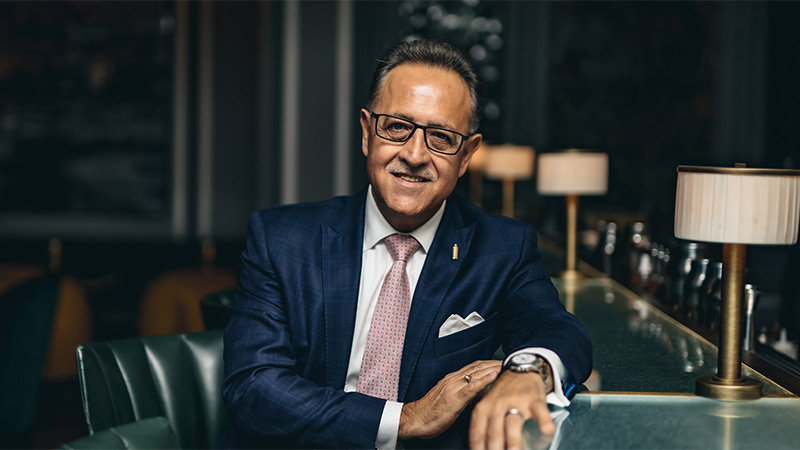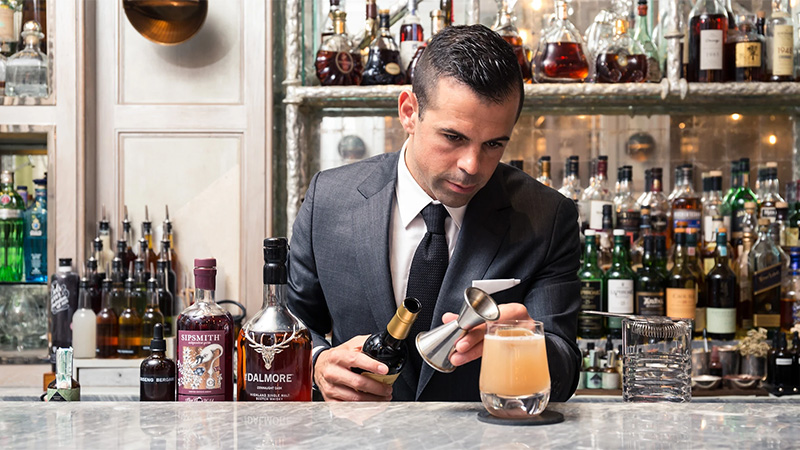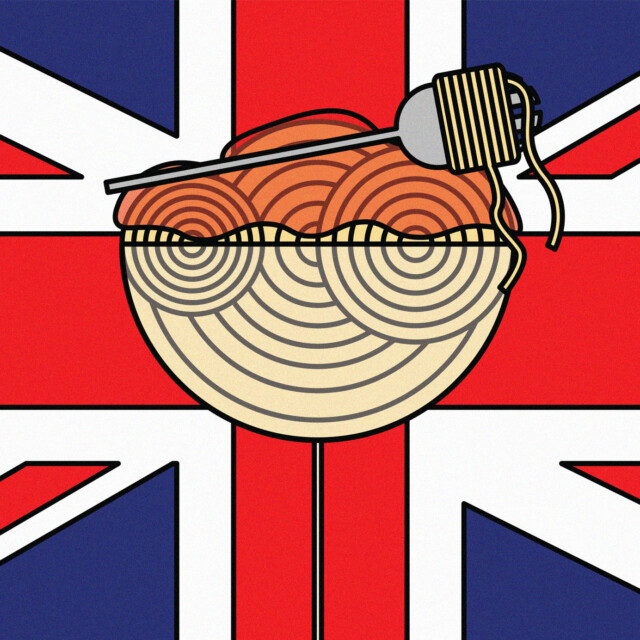By the fairest forms of measure the London drinks scene ranks among the best on Earth. This is where you’ll find the Connaught Bar, consistently ranked at the top of global lists. At Duke’s, you’ll settle in for the most mesmerizing Martini of your life. The English capital has also set a new standard for how hotel cocktail programs ought to operate, at places like Vesper Bar within the Dorchester and the Library Bar off the lobby of the Lanesbrough.
Varied as they all are in execution, a common thread comes to light when naming those who helm these respective operations: Ago Perrone, Alessandro Palazzi, Lucia Montanelli, Giorgio Roma — they all share the same citizenry. And it’s not British.
For more than two decades, the language of London cocktails has been spoken almost entirely with an Italian accent. As one of the world’s most diverse cities, it’s certainly not unusual to see foreigners ascend the ranks here. Indeed, it is roundly celebrated in a landscape like this. But how did a singular nation in particular come to dominate an entire segment of London hospitality?
The answer might just lie in a mishandled Hot Toddy, of all things. In December of 1982 Salvatore Calabrese roamed London looking for work. His English wife, who had recently lured him from an enviable job as a maître d’ along the Amalfi Coast, responded on his behalf to an advert in the newspaper for a barman position at Dukes in Mayfair. It was a role he didn’t initially win.
“They chose someone over me and he had decided to make Hot Toddies to deal with an especially cold winter,” the industry icon recalls. “He ended up flambéing the bar and one of the customers. His career went up in smoke.”
Calabrese was called in to take over and immediately reasoned that he needed a way to establish a point of separation. As a small space, Dukes was never going to be a high-volume operation. So to stand out, he developed an obsessive passion for classical revivalism. He didn’t want to serve a mere facsimile of a Sazerac or a Vesper Martini; instead he endeavored to present an exacting experience, wholly faithful to what had come before. It was a concept he eventually coined “Liquid History.” Its practice involved meticulous research, along with amassing a collection of vintage bottles (largely Cognac) and even bar equipment and stemware from those bygone eras.
Mediterranean Masters Are Born
The movement gained steam with local drinkers. But Calabrese’s real star turn didn’t arrive until 1987 when a persnickety guest of the hotel kept complaining about his Martinis being neither cold nor dry enough. After five days of browbeating, Calabrese came up with a novel solution: Stick the gin in the freezer. The patron — famed San Francisco Chronicle columnist Stanton Delaplane — was eminently pleased with the results. Enough so that he took to the newswire and proclaimed it the best Martini on the planet, attracting international attention for both Calabarese and his bar.
“God took six days to create the perfect world,” the barman known to some as “Il Maestro” says. “It took me five to create the perfect the Martini.”
“These masters really marked and changed the hotel bar scene, taking hospitality to new heights.”
Calabrese wasn’t the first Italian to assume a position of prominence in London. That distinction belongs to Peter Dorelli, the legendary former head barman at Pebble Bar from 1963 to 1984. But Calabrese was in the right place at the right time — namely London’s swanky Mayfair neighborhood in the late ‘80s to mid-‘90s — to inspire a fledgling scene. And to motivate many of his countrymen to follow a similar path of migration. He helped underscore the “if-you-could-make-it-here-you-could-make-it-anywhere” circumstances of the city and he did so with a flair that spoke very directly to fellow Italians.
“I have always seen London as a door to the globe, the hotspot for great professionals, the place where trends and innovations are set,” confirms Ago Perrone, the award-winning director of mixology at the Connaught Hotel. “This city is in constant move and evolution, with plenty of styles, concepts, and opportunities to discover, embrace, or even create from scratch. The Italian bar community has a natural inclination for hospitality, and they know that here they channel their drive and passion to forge their own path.”

In addition to Dorelli and Calabrese, he cites Giuliano Morandin of the Dorchester and Calabrese’s successor at Dukes, Alessandro Palazzi, as embodiers of that initial wave of Italian bartending dominance. “These masters really marked and changed the hotel bar scene, taking hospitality to new heights,” Perrone says. “They paved the way for my generation and the following ones.”
Incubation Nation
For his part, Perrone has been a key figure in the second wave. His status was secured soon after installing a trendsetting cocktail bar within the Connaught Hotel 15 years ago. He brought with him all the swagger and conviviality exemplified by the previous generation, along with a talented team of fellow expats. Some of those Italian artisans have gone on to head up bar programs elsewhere throughout the city, and Perrone continues to rely on his countrymen and women for support. Ask him today and he’ll credit Giorgio Bargiani and Maura Milia as the pillars of his team.
“More than anyone else, [Perrone’s] work has really helped cement the legacy of Italian bartenders here,” says Santino Cicciari, a former bar manager at the Connaught who currently heads up operations at Sale e Pepe in posh Knightsbridge. But he also pins part of the movement on the fact that London enjoys an abundance of ingredients that favor an Italian sense of preparation. “Gin is maybe the most used spirit,” he says. “We also tend to love fresh products — fruit and bitters and spices have always played a key role and allows for new textures to be introduced. Ingredients that balance well with spirits have an opportunity to tell a story.”
It only helps matters that London’s cocktail crowd has always been a sucker for a good story. Many of the menus around here read more like books, often spread out over dozens of pages, with history and relevant cultural touchstones interspersed throughout. But what’s perhaps most auspicious of all for Italian bartenders in London is the effervescence they tend to bring to the table, both figuratively and literally. These are the people who perfected the spritz. Coming from warmer, Mediterranean climes, they promise a certain transportive sort of hospitality for drinkers frequently looking for escape from gloomy skies.
“I think Italians have always had a big influence in our industry, for the passion and dedication we have towards the food and beverage world; it is in our tradition and culture.”
“Italians are known for the creation of aperitivo-style cocktails often incorporating vermouth and bitters, and are famously known to include herbs like basil and citrus,” says Facundo Gallegos, a Connaught Bar alum who now heads up the bar and restaurant at the St. Regis Venice. “Italians also embody true, genuine hospitality, which shines through in our work as well.”
In London they are afforded the opportunity to shine on one of the grandest stages in the world. Danilo Frigulti, head bartender at NoMad London, relishes this visibility along with the friendly sort of competitiveness that exists here. It forces him to keep pushing forward in his own program in order to stay relevant.
“You can go to world-class bars and see globally acclaimed bartenders performing live any day of the week,” he says. Frigulti isn’t surprised that many of those whom he turns to for inspiration share the same nationality. “I think Italians have always had a big influence in our industry, for the passion and dedication we have towards the food and beverage world,” he says. “It is in our tradition and culture.”
At Common Decency, in the basement of the NoMad hotel, Frigulti combines a passion for food and beverage into every glass. His cocktails are characterized by ingredients you’d expect to find at a dinner table rather than a bar. There’s a tequila drink made with Jerusalem artichoke and milk punch crafted around butternut squash. Preparations such as these could only be birthed in a scene that supports fearless boundary pushing. And as of now it is largely Italian bartenders who remain at the vanguard. But that future is not always guaranteed, of course.
What’s Next For the Italian Artisans Of London
A confluence of contemporary circumstances actively threatens to disperse this particular pool of talent. “Before Brexit, London used to give everyone an opportunity to start from ground zero,” says Allesandro Fiore, a bartender at the Library Bar inside the Lanesbrough Hotel. “I believe that with Brexit, and as the cost of living in London continues to rise, Italian bartenders are more likely to leave the country.”

Indeed, some have already gone off to do many great things elsewhere. Simone Caporale is a prime example. After stirring up an unprecedented string of global recognition at the Artesian Bar inside the Langham, the one-time Tales of the Cocktail “World’s Best Bartender” fixed his sights on a bar of his own. And when it came time to bring it to life, he took his talents to Barcelona. The resulting Sips opened in 2021 and has already risen the ranks to No. 3 on the annual World’s 50 Best Bars list.
“I hope that London will still be what it was for me: a place where if you want to learn and grow in the hospitality business you can do so by hard working and commitment.”
“I’ve seen a number of Italian bartenders coming back to Italy, after living in London, to bring new, inventive techniques and styles to their home country,” says St. Regis’s Gallegos, who himself left the city to head up a drinks program in his home country. “But London is an international city that will always uphold its status as one of the leading destinations around the world for outstanding food and beverage experiences.”
Gallegos believes that the large community of young Italian bartenders currently populating London can still hope to find the best training and experience there to kick their careers into high gear. But for that to endure they’ll need the right tutors. And they might be getting harder to find.
“Everything is happening too fast in the industry right now,” says Rudi Carraro, former senior bartender at the Artesian who repatriated in 2017 to become global brand ambassador for Gruppo Montenegro. “Mentors or persons that would like to see a young bartender succeed are not that common anymore. I hope that London will still be what it was for me: a place where if you want to learn and grow in the hospitality business you can do so by hard working and commitment. But there is already a big difference from when I was working there and now.”
Nevertheless, from a bar-goer’s perspective the scene appears as Italian as ever. The legacy of those pioneering paesanos — from Dorelli to Perrone — can be tasted across the entirety of this town. And if London can today lay claim to a title of “Cocktail Mecca” it is assuredly on account of their impact behind the stick. “In the mid- to late ‘90s we were creating a new golden age for London drinks culture,” Calabrese says. “To work in a great bar you didn’t go to France or to America, you came here. We created a big voice.”
To this day, it retains an unmistakably Italian accent.
